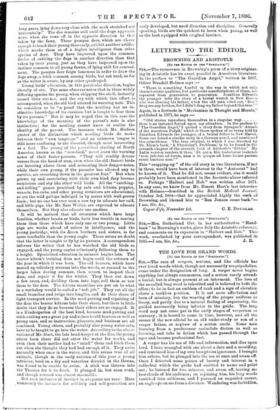LETTERS TO THE EDITOR.
BROWNING AND ARISTOTLE
['re TIE EDITOR OP TEE " SPECTATOR.")
S1R,—The recurrence in Browning's poem of a story originat- ing in Aristotle has its exact parallel in American literature. In the preface to "The Guardian Angel," written in 1867, Oliver Wendell Holmes says :—
" There is something fearful in the way in which not only characteristic qualities, but particular manifestations of them, are repeated from generation to generation. Jonathan Edwards the younger tells the story of a brutal wretch in New Havcn who was abusing his father, when the old man cried out, Don't drag me any farther, for I didn't drag any father beyond this tree.'"
Again, in a footnote in "Mechanism in Thought and Morals," published in 1871, he says :— "Old stories reproduce themselves in a singular way
Here is an instance forced upon my attention. In the preface to The Guardian Angel,' I quoted a story from Sprague's Annals of the American Pulpit,' which is there spoken of as being told by Jonathan Edwards the younger, of a brutal fellow in New Haven_ Some one found a similar story in a German novel, and mentioned the coincidence. The true original, to which I was directed by Dr. Elam's book, 'A Physician's Problems,' is to be found in the seventh chapter of the seventh book of Aristotle's 'Ethics.' My Latin version renders it thus, 'Et qui a alio trahebatur trahendi rnem jubebat ad foreis, nam a se (Drogue ad hune locum patron} suum tractum ease.'"
This " cropping-up " of the old story in two literatures, if not in three, would have been of interest to the " Antoerat " had he known of it. That he did not, seems evident, else it would probably have been mentioned in the footnote above referred to. Perhaps "Halbert and Hob" was written after 1871. In any case, we know from Mr. Ernest Hart's last interview with Holmes—described in the British Medical Journal, October 3rd, 1894—that he appreciated highly the work of Browning, and likened him to "Ben Jonson come back."— I am, Sir, Ste.,


















































 Previous page
Previous page